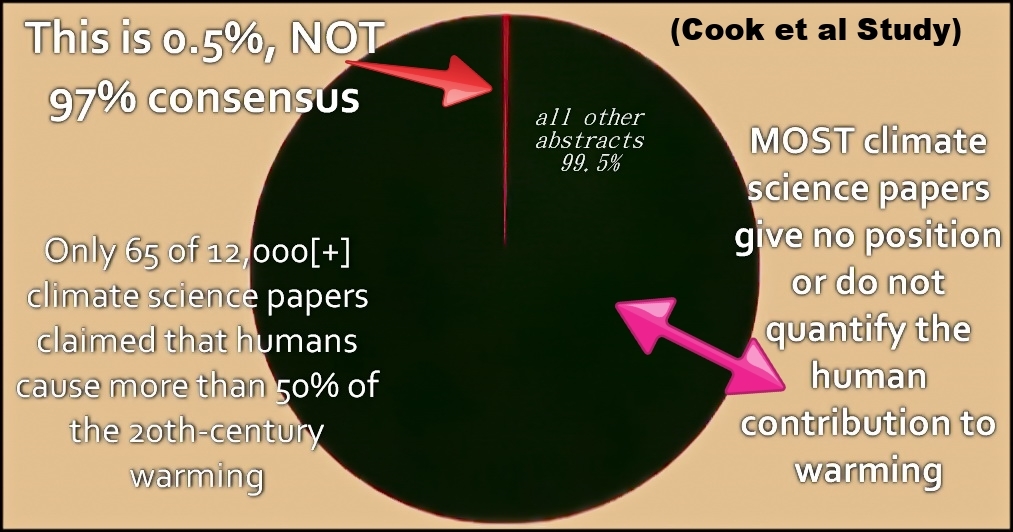It looks like you're using an Ad Blocker.
Please white-list or disable AboveTopSecret.com in your ad-blocking tool.
Thank you.
Some features of ATS will be disabled while you continue to use an ad-blocker.
share:
A few years back I heard the number 97 starting to be tossed around, in that context that 97 out of 100 scientists were in agreement. I didn't
really ask myself at first, "agreement on what?" I just accepted that ok, thats an overwhelming majority of scientists, there's got to be
something to this.
At one point in time I became curious and read the actual paper in question. I was literally shocked by what I found! I mean to call it a misrepresentation of the data is letting Cook etal off way too lightly. It's manipulative, shameful dishonest and I'll go so far as to say it.. FRAUD.
John Cook holds a Phd in Cognitive Psychology and is well intertwined into the climate change community. I thought I'd make this thread so people can have a look at the paper and data and make up their own minds as to whether we've been lied to about this consensus.
Link to Cook etal
This image is derived directly from the data pulled from the Cook paper.
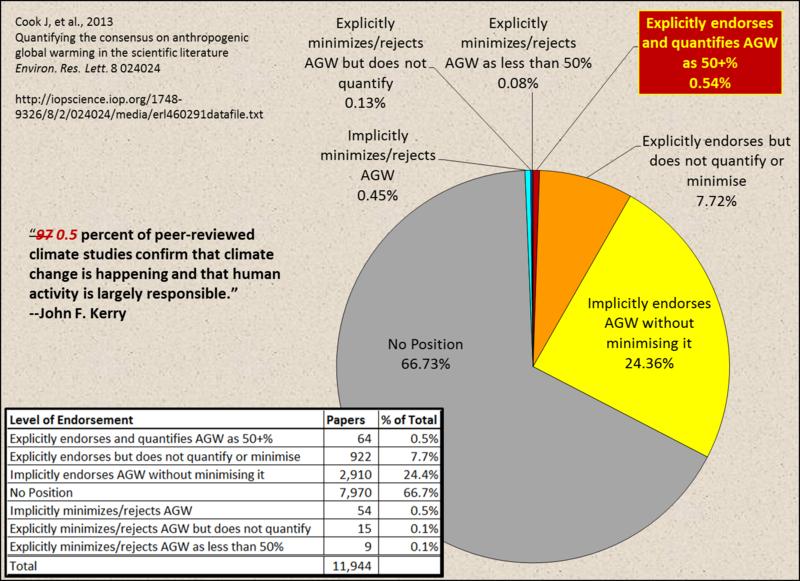
At one point in time I became curious and read the actual paper in question. I was literally shocked by what I found! I mean to call it a misrepresentation of the data is letting Cook etal off way too lightly. It's manipulative, shameful dishonest and I'll go so far as to say it.. FRAUD.
John Cook holds a Phd in Cognitive Psychology and is well intertwined into the climate change community. I thought I'd make this thread so people can have a look at the paper and data and make up their own minds as to whether we've been lied to about this consensus.
Link to Cook etal
The Cook study gave papers a numeric rating. Rating #1 was "explicitly endorses and quantifies AGW as >50%". Out of 12,464 papers considered, only 65 papers were in this category (note: this was just based on study participants reading the abstracts, not the full paper).
Based on that statistic alone, one could defend the claim that one half of one percent of papers on AGW clearly claim humans are the chief cause of it. That headline finding would be "less than one percent of expert papers explicitly agree that global warming is anthropogenic."
But maybe it's not fair to include the "no position" papers. Let's exclude those. In that case, the headline finding is "1.5% (65/4215) of expert papers that took some position on global warming explicitly agree that global warming is anthropogenic."
The full list of endorsement categories were as follows:
Explicitly endorses and quantifies AGW as >50% (65 articles)
Explicitly endorses but does not quantify or minimize (934 articles)
Implicitly endorses AGW without minimizing it (2934 articles)
No position (8269 articles)
Implicitly minimizes or rejects AGW (53 articles)
Explicitly minimizes or rejects AGW but does not quantify (15 articles)
Explicitly minimizes or rejects AGW as less than 50% (10 articles)
If we sum the rejection categories 5-7 together, there were 78 articles rejecting AGW, versus only 65 explicitly supporting the consensus. So another defensible headline finding is: "More articles implicitly or explicitly reject AGW than claim more than half of AGW is anthropogenic."
Or we could look at JUST the papers that give an explicit numeric percentage estimate. Comparing category 1 with category 7, we get this defensible headline: "87% of scientific articles that give a percentage estimate claim more than half of warming is anthropogenic". (though it would be important to note the actual number of articles in that case isn't much of a sample: 65 for versus 10 against).
Or if we want to rescue the original Cook number, that can be accomplished by adding a few caveats. Like so: "97% of articles on global warming that take a position on the matter either implicitly or explicitly endorse that human activity is causing some global warming"
Since the vast majority (98.5%) of these papers don't quantify how much warming, that's about as far as we can go.
This image is derived directly from the data pulled from the Cook paper.

a reply to: D8Tee
I'm not really surprised.
I was encouraged recently about the US EPA's Red team Blue team approach to sorting out this mess. As far as I'm aware they are going to re-visit all of the peer reviewed papers you noted and make an independent assessment.
Looking forward to it.
I'm not really surprised.
I was encouraged recently about the US EPA's Red team Blue team approach to sorting out this mess. As far as I'm aware they are going to re-visit all of the peer reviewed papers you noted and make an independent assessment.
Looking forward to it.
a reply to: theantediluvian
Don't count on it, he's trying to push the same garbage here
www.abovetopsecret.com...
Don't count on it, he's trying to push the same garbage here
www.abovetopsecret.com...
originally posted by: theantediluvian
a reply to: D8Tee
How about a source for the excerpt? It looks to me like you've copied part of a Stack Exchange post from 2013.
How about you, or anyone else for that matter, provide a believable and independently verified effort by governments worldwide to reduce carbon emissions in the form of reduced flight travel (tourism), military activity, global (and often unnecessary shipping for products that can be produced locally) activity, and industrial production that have resulted in anything else except a carbon tax based on erroneous and deliberately falsified data in order to penalise no-one except the proletariat?
Take your time.
a reply to: myselfaswell
As long as they have a good statistician that can put into simple terms what these numbers mean in real time . Oh and have a second category for the models which would have no bearing on the conclusions of the papers . If not then they will have to add the data from the Farmers Almanac .It at least has a higher probability of being correct compared to the models .
As long as they have a good statistician that can put into simple terms what these numbers mean in real time . Oh and have a second category for the models which would have no bearing on the conclusions of the papers . If not then they will have to add the data from the Farmers Almanac .It at least has a higher probability of being correct compared to the models .
originally posted by: theantediluvian
a reply to: D8Tee
How about a source for the excerpt? It looks to me like you've copied part of a Stack Exchange post from 2013.
so urce
a reply to: D8Tee
Gotta love this abstract, calling out Cooks paper for what it is.
Shredded Cooks paper.
Well done Legates and Soon, hope to see you at the Red vs Blue event showing how the science is far from settled.
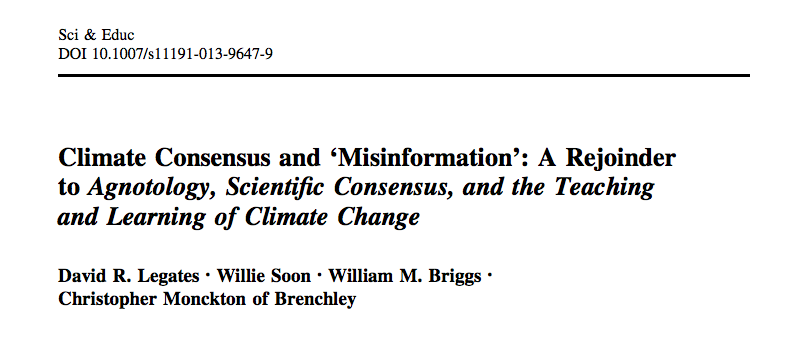
Source
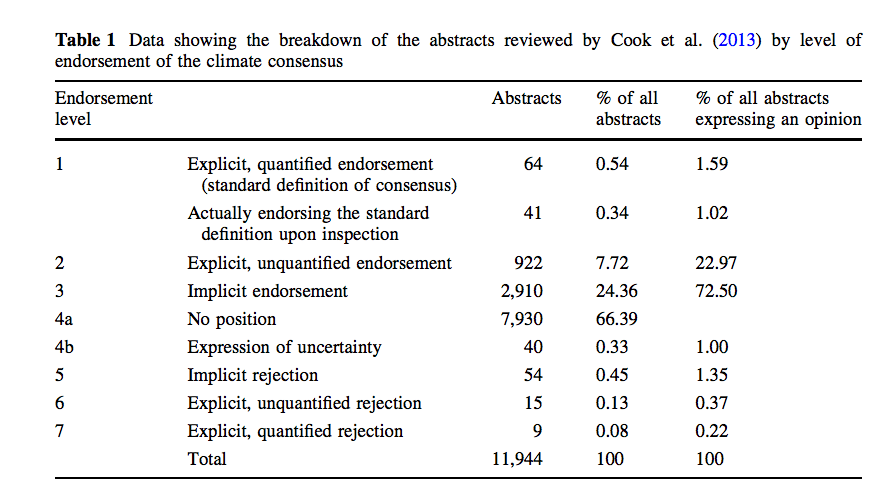
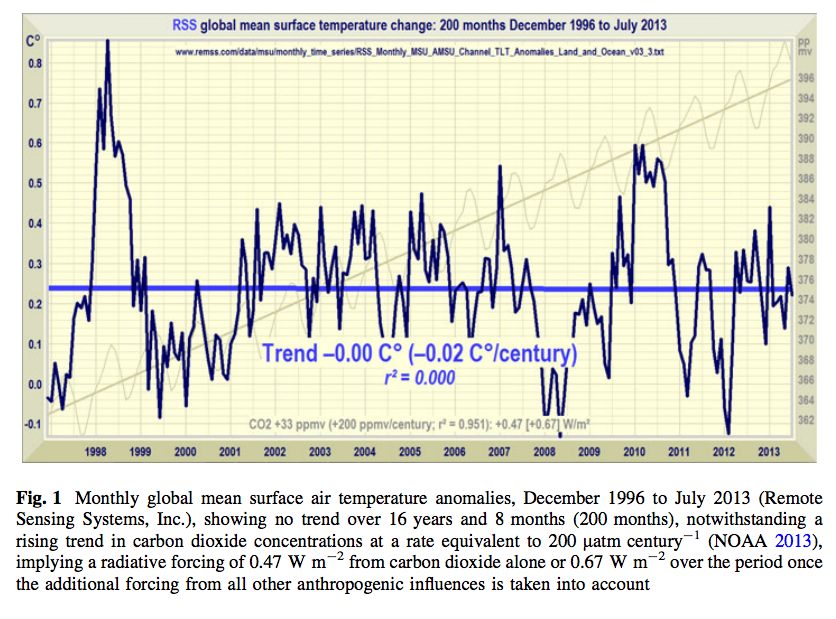
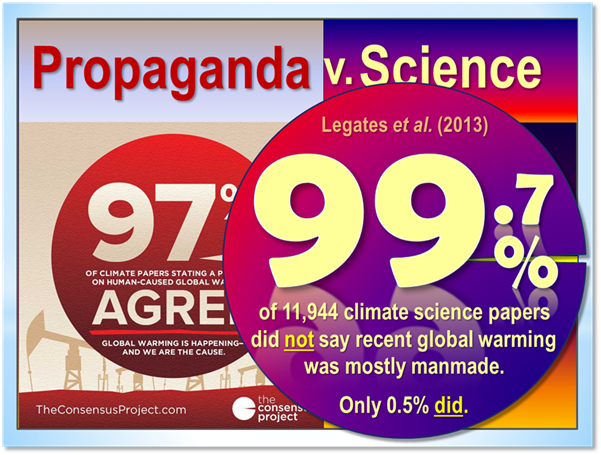
Gotta love this abstract, calling out Cooks paper for what it is.
Shredded Cooks paper.
Well done Legates and Soon, hope to see you at the Red vs Blue event showing how the science is far from settled.

Agnotology is the study of how ignorance arises via circulation of misinformation calculated to mislead. Legates et al. had questioned the applicability of agnotology to politically-charged debates. In their reply, Bedford and Cook, seeking to apply agnotology to climate science, asserted that fossil-fuel interests had promoted doubt about a climate consensus. Their definition of climate ‘misinformation’ was contingent upon the post-modernist assumptions that scientific truth is discernible by measuring a consensus among experts, and that a near unanimous consensus exists. However, inspection of a claim by Cook et al. of 97.1 % consensus, heavily relied upon by Bedford and Cook, shows just 0.3 % endorsement of the standard definition of consensus: that most warming since 1950 is anthropogenic. Agnotology, then, is a two-edged sword since either side in a debate may claim that general ignorance arises from misinformation allegedly circulated by the other. Significant questions about anthropogenic influences on climate remain. Therefore, Legates et al. appropriately asserted that partisan presentations of controversies stifle debate and have no place in education
Source



edit on 8-6-2017 by D8Tee because: (no reason given)
edit on 8-6-2017 by D8Tee because: (no reason
given)
These discussions always end the same, and have the same middle, and usually the same beginning.
here is something that isn't said by many at all:
"The climate isn't changing", so it would be fair to say that there is a general consensus that indeed the climate does change and is actively in the process of changing as we speak. So for all those who want to use the retarded label "climate denier", don't be that guy.
The big question most who are usually labeled "climate denier" by the really, really pompous arrogant idiots, is what percentage if any, man is responsible for the current climate change. Knowing that indeed the climate is an ever changing thing. Currently, there may be ideas, guesses, but no concrete number like 97% caused by man proven by "x". With all the factors involved, including space, the sun, the core of the Earth, the population, pollution, deforestation, alien influence, livestock flatulence, I'd venture a strongly uneducated guess that it's a tough number to prove, let alone imagine.
With the 97% number, that has been bandied about since this became a political stance along with a scientific discussion, it almost seems as if anyone who doesn't jump on the train, will be ridiculed, shamed, and forced to either accept the label of denier, of conform to the overwhelming 97%.
None of that is to say that Climate change is a hoax, or that we will all die a fiery death if the global temps rise 1.5 degrees, it's just to help those who would fall into the category of "really, really pompous arrogant idiots", that some of us just have more questions and a tiny bit of mistrust, based on previous experience.
here is something that isn't said by many at all:
"The climate isn't changing", so it would be fair to say that there is a general consensus that indeed the climate does change and is actively in the process of changing as we speak. So for all those who want to use the retarded label "climate denier", don't be that guy.
The big question most who are usually labeled "climate denier" by the really, really pompous arrogant idiots, is what percentage if any, man is responsible for the current climate change. Knowing that indeed the climate is an ever changing thing. Currently, there may be ideas, guesses, but no concrete number like 97% caused by man proven by "x". With all the factors involved, including space, the sun, the core of the Earth, the population, pollution, deforestation, alien influence, livestock flatulence, I'd venture a strongly uneducated guess that it's a tough number to prove, let alone imagine.
With the 97% number, that has been bandied about since this became a political stance along with a scientific discussion, it almost seems as if anyone who doesn't jump on the train, will be ridiculed, shamed, and forced to either accept the label of denier, of conform to the overwhelming 97%.
None of that is to say that Climate change is a hoax, or that we will all die a fiery death if the global temps rise 1.5 degrees, it's just to help those who would fall into the category of "really, really pompous arrogant idiots", that some of us just have more questions and a tiny bit of mistrust, based on previous experience.
originally posted by: network dude
With the 97% number, that has been bandied about since this became a political stance along with a scientific discussion, it almost seems as if anyone who doesn't jump on the train, will be ridiculed, shamed, and forced to either accept the label of denier, of conform to the overwhelming 97%.
None of that is to say that Climate change is a hoax, or that we will all die a fiery death if the global temps rise 1.5 degrees, it's just to help those who would fall into the category of "really, really pompous arrogant idiots", that some of us just have more questions and a tiny bit of mistrust, based on previous experience.
Political stance, ridicule, force, shame, hoaxes and idiots do not belong in the realm of science. But that 97% and what it represents does.
The data of the Cook paper presented by the OP is 100% manipulated to fit their narrative. It's unethical and unscientific.
originally posted by: Jubei42
originally posted by: network dude
With the 97% number, that has been bandied about since this became a political stance along with a scientific discussion, it almost seems as if anyone who doesn't jump on the train, will be ridiculed, shamed, and forced to either accept the label of denier, of conform to the overwhelming 97%.
None of that is to say that Climate change is a hoax, or that we will all die a fiery death if the global temps rise 1.5 degrees, it's just to help those who would fall into the category of "really, really pompous arrogant idiots", that some of us just have more questions and a tiny bit of mistrust, based on previous experience.
Political stance, ridicule, force, shame, hoaxes and idiots do not belong in the realm of science. But that 97% and what it represents does.
The data of the Cook paper presented by the OP is 100% manipulated to fit their narrative. It's unethical and unscientific.
Hey, thanks for being "that guy". So any questions are to met with ridicule and derision.
Exactly what percentage is man responsible for with regards to the current warming claimed to be the "A" part of AGW?
We can later discuss sea level rise.
a reply to: network dude
Where is the ridicule and derision? This is very serious. I'm accusing the OP of fraudulently representing data from a scientific paper to fit a narrative
That percentage is not within the scope, the research is about scientific consensus on man having a contributing factor in global warming
Where is the ridicule and derision? This is very serious. I'm accusing the OP of fraudulently representing data from a scientific paper to fit a narrative
That percentage is not within the scope, the research is about scientific consensus on man having a contributing factor in global warming
a reply to: Jubei42
LOL, don't make me quote you on the same page, is highly disingenuous. If you disagree with the OP, state facts backed up by scientific links to prove your point. Calling people idiots because you disagree with their work isn't exactly the "scientific method."
ETA:
as far as this:
The fact that today's science cannot answer this with any certainty, is the hidden meaning of my post. I don't discredit science at all, nor do I disbelieve the facts. But my purely novice mind based logic tells me that many more factors play into this and there is no way to be as sure as we are led to believe about the big picture. The C02 data is hard to refute, so it's something that most will have to deal with eventually. But how much that effects the overall climate of the entire planet is what's in question.
LOL, don't make me quote you on the same page, is highly disingenuous. If you disagree with the OP, state facts backed up by scientific links to prove your point. Calling people idiots because you disagree with their work isn't exactly the "scientific method."
ETA:
as far as this:
That percentage is not within the scope, the research is about scientific consensus on man having a contributing factor in global warming
The fact that today's science cannot answer this with any certainty, is the hidden meaning of my post. I don't discredit science at all, nor do I disbelieve the facts. But my purely novice mind based logic tells me that many more factors play into this and there is no way to be as sure as we are led to believe about the big picture. The C02 data is hard to refute, so it's something that most will have to deal with eventually. But how much that effects the overall climate of the entire planet is what's in question.
edit on 8-6-2017 by network dude because: added thought
a reply to: Jubei42
That is Cooks own data, accusing me of fraudulently misrepresenting it?
You must have totally missed where I posted the Legates and Soon paper in this very thread a couple posts back? That paper does a thorough job of debunking your beloved Cook consensus. At least take the time to read the abstract, I quoted it inline with the post.
And incase you are not going to scroll up and look, here's Legates and Soon doing much the same as I did in my initial post, are they fraudulent as well? Pretty big accusation to be hurling around seeming as how you have no evidence of any fraud on my part.

I'm accusing the OP of fraudulently representing data from a scientific paper to fit a narrative
That is Cooks own data, accusing me of fraudulently misrepresenting it?
You must have totally missed where I posted the Legates and Soon paper in this very thread a couple posts back? That paper does a thorough job of debunking your beloved Cook consensus. At least take the time to read the abstract, I quoted it inline with the post.
And incase you are not going to scroll up and look, here's Legates and Soon doing much the same as I did in my initial post, are they fraudulent as well? Pretty big accusation to be hurling around seeming as how you have no evidence of any fraud on my part.

edit on 8-6-2017 by D8Tee because: (no reason given)
a reply to: network dude
The same logic error the OP is making is the same question you were asking. The exact percentage of mans contributing factor is not relevant in a study of scientific consensus on man having a contributing factor in global warming.
See, it is not relevant to what degree man is responsible. That's a question for later I'm sure.
The same logic error the OP is making is the same question you were asking. The exact percentage of mans contributing factor is not relevant in a study of scientific consensus on man having a contributing factor in global warming.
See, it is not relevant to what degree man is responsible. That's a question for later I'm sure.
originally posted by: Jubei42
a reply to: network dude
The same logic error the OP is making is the same question you were asking. The exact percentage of mans contributing factor is not relevant in a study of scientific consensus on man having a contributing factor in global warming.
See, it is not relevant to what degree man is responsible. That's a question for later I'm sure.
Sure, fair enough.
So based on the information provided in the OP, can you explain with backup, why it's not factual?
If you are right, you win the debate, that's how this all works.
new topics
-
Let's talk planes.
General Chit Chat: 7 hours ago -
January 6th report shows disturbing trend (nobody is shocked)
US Political Madness: 9 hours ago -
Inexplicable military simulation - virtual reality showdown in the night..
The Gray Area: 9 hours ago -
The Truth about Migrant Crime in Britain.
Social Issues and Civil Unrest: 10 hours ago
top topics
-
Trudeau Resigns! Breaking
Mainstream News: 12 hours ago, 26 flags -
January 6th report shows disturbing trend (nobody is shocked)
US Political Madness: 9 hours ago, 20 flags -
Live updates: Congress meets to certify Trump's presidential election victory
US Political Madness: 13 hours ago, 12 flags -
The Truth about Migrant Crime in Britain.
Social Issues and Civil Unrest: 10 hours ago, 10 flags -
Gravitic Propulsion--What IF the US and China Really Have it?
General Conspiracies: 14 hours ago, 9 flags -
Let's talk planes.
General Chit Chat: 7 hours ago, 5 flags -
Greatest thing you ever got, or bought?
General Chit Chat: 14 hours ago, 4 flags -
Inexplicable military simulation - virtual reality showdown in the night..
The Gray Area: 9 hours ago, 2 flags
active topics
-
Short vs. Long?
General Chit Chat • 16 • : whereislogic -
Judge rules president-elect Donald Trump must be sentenced in 'hush money' trial
US Political Madness • 32 • : WeMustCare -
January 6th report shows disturbing trend (nobody is shocked)
US Political Madness • 50 • : RazorV66 -
Gravitic Propulsion--What IF the US and China Really Have it?
General Conspiracies • 16 • : YouSir -
Trudeau Resigns! Breaking
Mainstream News • 65 • : firerescue -
Greatest thing you ever got, or bought?
General Chit Chat • 21 • : rickymouse -
Islam And A Book Of Lies
Religion, Faith, And Theology • 12 • : nugget1 -
Trump says ownership of Greenland 'is an absolute necessity'
Other Current Events • 65 • : BingoMcGoof -
Let's talk planes.
General Chit Chat • 7 • : rickymouse -
Democrats Introduce Bill That Will Take Away Donald Trumps Secret Service Protection
2024 Elections • 77 • : WeMustCare

